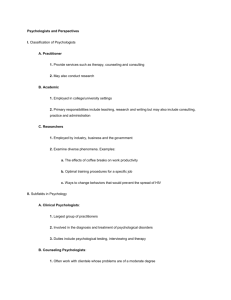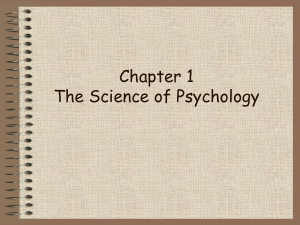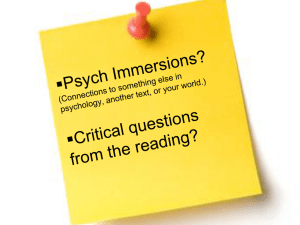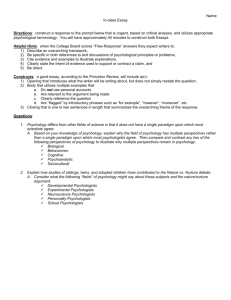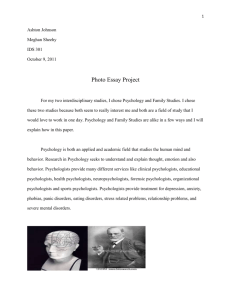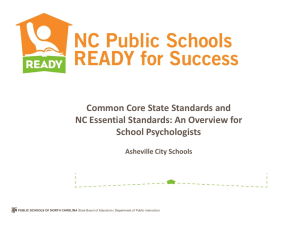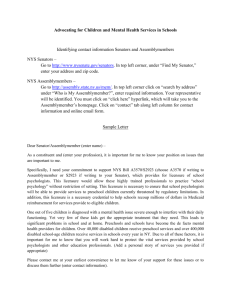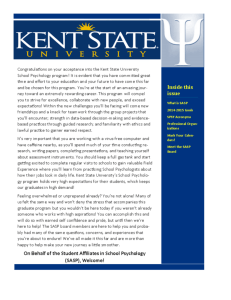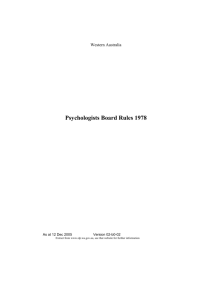Careers in Psychology
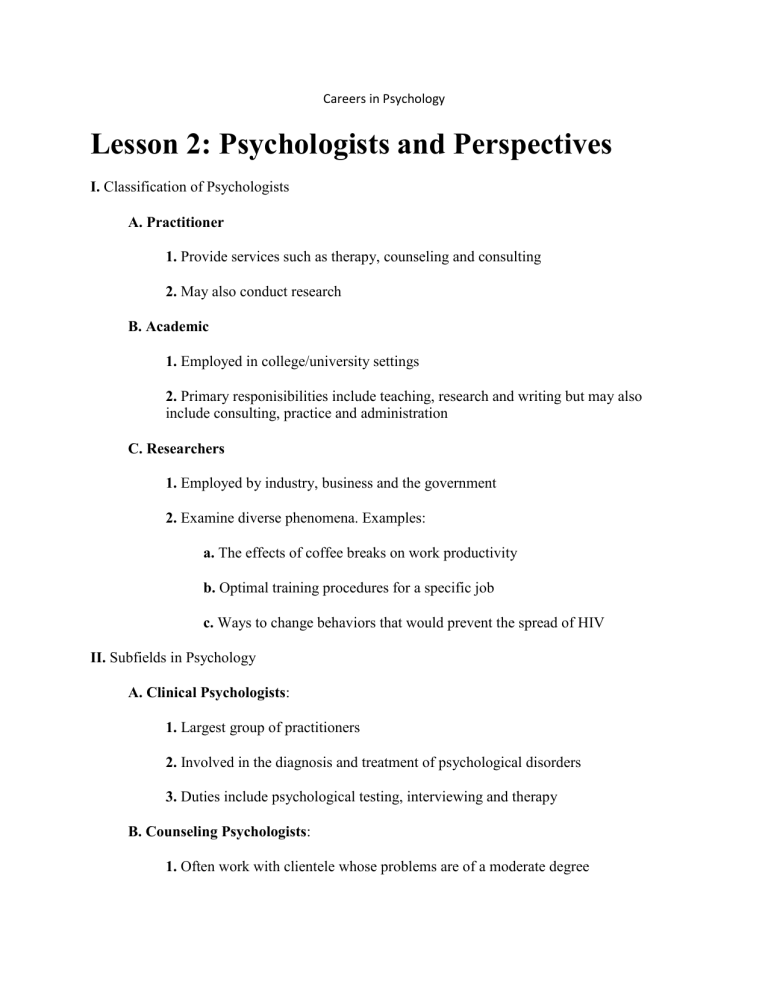
Careers in Psychology
Lesson 2: Psychologists and Perspectives
I.
Classification of Psychologists
A. Practitioner
1.
Provide services such as therapy, counseling and consulting
2.
May also conduct research
B. Academic
1.
Employed in college/university settings
2.
Primary responisibilities include teaching, research and writing but may also include consulting, practice and administration
C. Researchers
1.
Employed by industry, business and the government
2.
Examine diverse phenomena. Examples: a.
The effects of coffee breaks on work productivity b.
Optimal training procedures for a specific job c.
Ways to change behaviors that would prevent the spread of HIV
II.
Subfields in Psychology
A. Clinical Psychologists :
1.
Largest group of practitioners
2.
Involved in the diagnosis and treatment of psychological disorders
3.
Duties include psychological testing, interviewing and therapy
B. Counseling Psychologists :
1.
Often work with clientele whose problems are of a moderate degree
2.
Many counseling psychologists specialize in marital or family counseling
C. School Psychologists :
1.
Concerned with social, intellectual and emotional development of elementary and secondary students
2.
Work with children, parents and teachers
3.
Often test students for special programs
D. Educational Psychologists : Involved in teacher training, curriculum design and other related educational processes
E. Industrial/Organizational Psychologists :
1.
Work in business and industry
2.
Attempt to improve productivity
3.
May develop employee selection programs, work with advertisers, study consumer behavior or design equipment
F. Experimental Psychologists:
1.
Broad classification for laboratory researchers
2.
Work primarily in a specific area, such as memory, language or animal behavior
G. Social Psychologists:
1.
Experimental psychologists who study social situations
2.
Study topics such as conformity, obedience and leadership style
A. Developmental Psychologists : Experimental psychologists who typically research behavior changes occurring across the lifespan that are due to maturation and development
B. Psychometric Psychologists :
1.
Specialize in the measurement of behavior
2.
Particularly skilled at using statistical procedures to develop reliable and valid tests
III.
Contemporary Theoretical Orientations in Psychology
A. Behavioral Approach
1.
First described by John B. Watson, 1913
2.
Emphasized environmental detenninants of behavior a.
Role of heredity greatly deemphasized but not totally denied b.
Environment can be manipulated to change behavior, whereas heredity cannot (as yet)
3.
Deal with directly observable behaviors a.
Explain behavior by assessing the effects of external stimuli b.
Behavior is detennined by the occurrence of external events
4.
B.F. Skinner: Prominent advocate for this approach
B. Biological Approach
1.
Behavior understood by describing underlying biochemical and neurological causes
2.
Reductionistic: Observable behaviors reduced to physiological explanations
3.
Roger Sperry: Won Nobel Prize for his split-brain research
C. Cognitive Approach
1.
Origins can be traced to Gestalt psychology, as cognitive psychologists study thoughts and mental processes
2.
Study the intervening mental processes between stimulus inputs and response outputs
3.
Significant contributions made in the areas of language, thought and memory
4.
Prominent figures include Jerome Bruner, Jean Piaget, Herbert Simon and Noam
Chomsky
D. Humanistic Approach
1.
Emerged in the 1950s
2.
Viewed behavior as a product of free will and opposed the determinism of behaviorism and psychoanalysis
3.
Believed too much emphasis placed on "rat studies" in the understanding of human behavior
4.
Emphasized the inherent goodness of human beings
5.
Developed methods of psychotherapy consistent with their views
6.
Prominent figures include Carl Rogers, Abraham Maslow and Gordon Allport
E. Psychoanalytic Approach
1.
Developed by Sigmund Freud
2.
Human behavior primarily determined by unconscious processes
3.
Theory not based on experimental evidence; many aspects of Freud's psychoanalytic theory are untestable
4.
Influential on American psychology (e.g., stressed the importance of early experiences in determining later behavior patterns) http://www.apa.org/ed/precollege/topss/lessons/secure/intro-2.aspx
